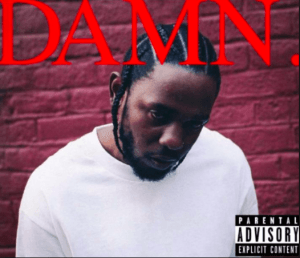By Jeremy Austin Staff Reporter

Kendrick Lamar’s album damn gets into his life and how he became a successful rapper. (Photo courtesy of Spotify)
For the month of February, the UMF New Commons Project is exhibiting their selection of rapper Kendrick Lamar’s 2017 album DAMN. as an essential work both to the students on campus and to the populace of Maine as a whole.
The goal of the project according to its director UMF English professor Kristen Case is twofold. “The first,” Case said, “is we wanted to talk to people all around the state about cultural works… that they care about and hear about why they think they’re important.” Works included paintings, albums, movies, books, etc., and overall there were 160 submissions.
“Another really important part of it,” Case continued, “is [helping] articulating some ideas about why the humanities matter.” These works all came from either UMF students or from folks all around the state, with the goal of creating both the sense of a cultural commons in the state as well as promoting the importance of the humanities.
The album’s nomination, a video sent in by Kara Chandler of Oakland, made the case for why the album should be selected by the project. “As popular as Lamar is,” Chandler explains, “I feel like he doesn’t get the correct amount of recognition for the content of his songs that he deserves—especially for the songs on this album that target relevant topics in today’s society such as racial bias, poverty and police brutality.”
Chandler describes the album’s first eight tracks, starting with the opening spoken word piece called, “BLOOD.,” and ending with the album’s lead single, “HUMBLE.” The songs cover a wide selection of social issues that Chandler goes through, including being black and famous (“YAH.”), poverty (‘FEEL.”), loyalty (“LOYALTY.”), and the notion that he’s the same on the inside as everyone else regardless of his skin color (“DNA.”).
On selecting the album, Case said that Chandler’s video made a really convincing argument. “She basically talked about the impact it had on her as a high school student to be hearing this music,” Case said. “Many of us just felt moved by that argument and actually persuaded by it.”
She went on to say that she and the others on the committee of faculty, students, community members and many others felt that this was an important experience for a high school student in a “rural, mostly white community” to have.
The project’s assistant director, UMF postdoctoral fellow of Digital and Public Humanities Stephen Grandchamp, said in an email interview, “The original nomination video was particularly powerful in explaining how the album inspires today’s youth to become politically engaged. More than that, DAMN. is a fantastic example from an important contemporary artistic genre (hip hop) that is meaningful to our community.”
Grandchamp also said of the entire project, “One of the aspects of the New Commons Project I love most is how it opens a discussion of artistic works among various populations in our community… Many of the most rewarding moments have been when these groups—students, faculty, community members, etc.—articulate why they believe a work, genre, or author is particularly important to them.”